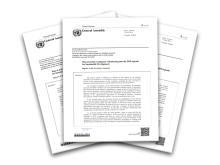In this report, the UN Secretary-General has highlighted several priority actions that will enable stakeholders to maximize the impact of voluntary efforts for peace and development under the 2030 Agenda. A shift from ad hoc and isolated volunteer projects to sustainable investment at scale is needed to widen volunteering opportunities and ensure the inclusion of all types of people. Increased practice - sharing and knowledge development, in particular on informal volunteering and volunteering in fragile and low-income contexts, are required.
The report is submitted in response to the request by the General Assembly in its resolution 70/129 that the Secretary-General report at its seventy-third session on the implementation of that resolution, including the plan of action to integrate volunteering into peace and development policies and programmes.
The plan of action is a road map to integrate volunteerism into the 2030 Agenda. Through this framework, the United Nations, Governments, civil society, including academia and the private sector, and ordinary citizens can support and leverage the potential of volunteerism as a tested and effective mechanism that deepens and broadens citizen engagement and sustainable development outcomes.
The report, the first since the adoption of the plan of action and the Sustainable Development Goals in 2015, confirms progress towards each objective. It also confirms that people’s ownership of the Goals is increasing, as many Governments value the whole-of-society approach. Governments and their development partners have made progress in terms of recognizing voluntary action as an asset for peace and development. At the international, national and local levels, there is an increasing alignment between peace and sustainable development priorities and volunteerism approaches. More Governments, United Nations entities, researchers and private sector and civil society actors are prioritizing research, data collection and knowledge exchange on volunteering.
At the same time, several areas for attention are identified throughout the report. Governments, in partnership with United Nations entities, volunteer-involving organizations and other stakeholders, should continue to increase the integration of volunteerism into national strategies, action plans and programming aimed at achieving the Sustainable Development Goals.
The contribution of volunteers should be systematically integrated into Member States’ voluntary national reviews and other relevant reporting mechanisms under the 2030 Agenda, the Sendai Framework and the Paris Agreement. Sustained and predictable investment is required from Governments and their development partners to create an enabling environment for volunteering that can help to accelerate and measure progress under the Sustainable Development Goals. Recognizing voluntary action as a development asset requires reflection on the appropriate scale and mechanisms for creating transformative partnerships with citizens in line with national development priorities.
To promote and facilitate the inclusion of all peoples and reduce inequalities, Governments, with United Nations entities, volunteer-involving organizations and other stakeholders, should widen opportunities for people’s engagement through volunteering, in particular for those groups left furthest behind. As a form of cooperation rooted in social relationships, the potential of volunteerism for fostering the inclusion and empowerment of marginalized groups will not be fully realized without policy coherence and related investments. A greater focus by all actors on understanding, nurturing and investing in informal volunteering is required, owing to its higher prevalence in fragile contexts and higher female participation rate. The protection, security and well-being of volunteers must be of the highest priority. Governments should approve and apply policies that safeguard both the physical and social protection of volunteers and guarantee that adequate medical, disability and death benefits are universally provided.
To facilitate knowledge exchange and cooperation, Governments and their development partners should scale up the use of the common measurement indicators and methodologies provided in the ILO Manual on the Measurement of Volunteer Work, most urgently to increase the availability of data on low-income contexts. Innovations on measurement carried out by all stakeholders should draw on this common methodological foundation. Volunteer measurement data have the potential to improve the analysis of the means of implementation of the Sustainable Development Goals as a basis for investment decisions.

